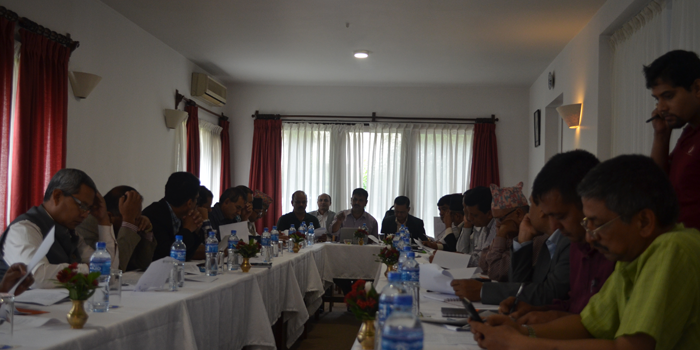Bearing in mind the right time to press the parliamentarians on their roles to protect people’s rights and devise the provisions in the near final constitution, freedom1 Forum organized a dialogue among the parliamentarians on July 31. It was organized in a bid to make them aware on the provisions of the draft constitution which are hostile to freedom1 of expression and journalists’ rights.
Gathering 40 persons, including a dozen of parliamentarians from various political parties, legal practitioners, press freedom1 advocates and senior journalists, discussion was focused on how to ensure the press freedom1 and protect journalists’ rights in the new constitution.
Most of the speakers from the media fraternity underscored the need to delete the unnecessary provisos under the fundamental rights to freedom1, especially the freedom1 of expression.
Making comments on the FNJ’s suggestion relating to FoE in the new constitution, freedom1 Forum’s Chairperson Taranath Dahal, said the FoE was useful more to the political leaders than to journalists. As it is an element of democracy, it is enshrined under the fundamental rights of the constitution. “But, the 13/14 provisos on the Article (of draft constitution) on FoE reflects the party-less panchayat system of the country. So, it must be corrected.”
According to him, State’s control on FoE was against democracy. He also made aware the parliamentarians that there was no provision that anyone violating the FoE would be punished.
Similarly, another point raised prominently was clear definition of privacy/secrecy.
He supported the FNJ stand that Right to Information should be clearly defined incorporating the words- right to seek, receive and impart information.
Another commentator, Vice-Chairman of Nepal Bar Association, Tikaram Bhattarai, said as the Republic is the optimum form of democracy, press freedom1 is inevitable.
The limitations on FoE must be understandable but not ambiguous.
However, another commentator Dr Ram Krishna Tilalsena said not any of fundamental rights needs to be modified with any adjective as ‘full’ or ‘inclusive’. So, mere mention of ‘full’ does not ensure full press freedom1. According to him, vague words are unacceptable but ‘constructive ambiguity’ can be entertained over the times.
“As parliamentary system itself is the system of RTI and FoE, restriction are unacceptable,” he underlined.
IMS consultant Binod Bhattarai suggested the parliamentarians to be aware of the incitement to violence (separation of speech and action) while making provision on FoE.
On the occasion, most of the CA members admitted that the draft constitution was verbose, lengthy and ambiguous.
Lawmaker including CPN-UML, Prakash Jwala; Ramhari Khatiwada of the Nepali Congress, member of the Constitutional Political Dialogue and Consensus Committee Gopal Dahit, Ram Narayan Bidari of the UCPN (Maoist ), Yogendra Chaudhari of the Madhesi Janadhikar Forum (Democratic), Garima Saha among others, said they would try their best to address the genuine demands on the guarantee of FoE and press freedom1.

